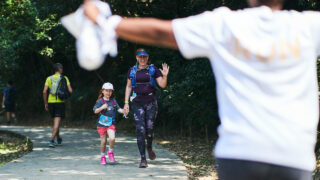Adventure travel is one of the fastest growing segments of the travel industry. And in Hong Kong, we love it. We travel to amazing places to cross deserts, to climb mountains and, in particular, to run marathons. These days, fit travellers really are earning their cocktail by the pool! However, there is a serious side to be aware of. Marathon runners may feel young and healthy, but they must tune in to warning signs of a potentially deadly syndrome – sudden cardiac death syndrome.
Clark’s Story
Many expats are adventurous and super-fit. So, this story might be a bit spooky, because it starts with a super-fit adventure traveller who ended up having the fright of his life. We’ll call him Clark, to keep his identity a secret.
In his 40s, Clark had been competing in marathons for over 10 years. Living in Hong Kong, he’d entered races both at home and away. He loved the experience of running marathons and had not suffered from significant health problem. He was a healthy and fit runner.
In 2018, Clark took his running shoes and jumped on a plane to compete in a marathon in Japan. All was going well for most of the run, but towards the end, he faltered and passed out while on the course.
Luckily, under the guidance of an on-site medical team, Clark regained consciousness. Medics attributed this loss of consciousness to a potential case of exhaustion. As an avid runner, he quickly recovered, travelled back to Hong Kong and continued his training for marathons and long-distance runs.
One month later, Clark again travelled back to Japan with the goal of completing another marathon. Unfortunately, history repeated itself and at the 30km mark, disaster struck and he passed out again.
This time it was different. When medics reached Clark, he had no pulse. Immediately they performed CPR on-site and he was, fortunately, revived. Marathon organisers sent him to hospital where doctors identified an abnormal coronary vessel via a CT scan. Clark rested and, once he’d recovered and was ready to travel, he came back to Hong Kong to seek treatment for his condition. It was at this point that he met DR LI SIU LUNG, a specialist in Cardiology from Union Hospital. Dr Li explains, “His heart had a major vessel with an unusual pathway. This was forcing some external compression.” Such an abnormality meant Clark didn’t have enough blood going through a specific part of his heart, especially when he competed. “This caused him to have pulseless-arrhythmia. If he wasn’t immediately taken care of in Japan, he certainly would have died,” says Dr Li.
Clark received open surgery to relocate the abnormal vessel. Now, he’s back running marathons and living his life; “He’s training for a marathon again!” says the doctor with a smile.
This is a story with a happy ending, but the reality is that Clark was very lucky he didn’t pass away from sudden cardiac death syndrome. According to Dr Li, not all stories end up the way they did for this expat. This particular cardiac episode happened at a public event with professionally trained medical staff who could effectively administer CPR. He was “lucky”.
About the Syndrome
Dr Li says, “In general, when people have unexpected heart-related deaths, we call this sudden cardiac death syndrome. The word ‘cardiac’ suggests the death is either related to the structure of the heart or arrhythmia or coronary heart disease.”
Can healthy, fit people have heart problems? According to Dr Li, yes – and men are at a higher risk of this. To put the risk into perspective, a study in the UK showed that only one person per 1.6 million people died in such a way. In Hong Kong, we have about 60 cases a year. While this is not a common death when compared to leading causes such as stroke or cancer, the shock is that it is sudden and unexpected.
A Prevention Plan
The story begs the question, what can marathon runners do to ensure they don’t encounter the same experience? “It requires screening, but knowing which people to screen is up for debate,” says Dr Li. While the syndrome is uncommon and sudden, there are some warning signs to look out for. Anyone who experiences the following signs should seek medical advice:
- unusual chest pain and shortness of breath upon exertion;
- fainting;
- unexpected syncope (temporary loss of consciousness usually related to insufficient blood flow to the brain); or,
- a family history of sudden death.
Dr Li’s advice is clear: “Know your body clearly and be alert for abnormal symptoms during exercise. Make sure you have a general check-up and seek medical advice before starting an exercise regime.” He continues, “Stay up to date with your checkups and blood work. If you have a family history of a heart problems or sudden death, your specialist will help you with more detailed tests.”
See more in our Health & Fitness section
Marathons, runs and races in the region
How I won my first Muay Thai fight
Great resistance band workouts
This article first appeared in the Home Décor issue of Expat Living magazine. Subscribe now so you never miss an issue.







